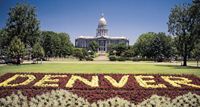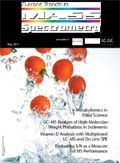Preview of the 59th Annual ASMS Conference
Special Issues
A preview of the this year's ASMS Conference, taking place June 5–9 in Denver, Colorado.
We present a brief overview of this year's ASMS conference, which takes place June 5–9, 2011, in Denver, Colorado.
A popular theme song from the 1980s comes to mind when thinking about the 59th Annual ASMS Conference on Mass Spectrometry and Allied Topics — "Sometimes you want to go where everybody knows your name, and they're always glad you came." While the conference floor is a long way from the Boston-based Cheers bar, the sentiment of welcome and familiarity among friends and colleagues is always present at this show.

Mark Lewis/Getty Images
This year's conference will be held at the Colorado Convention Center in Denver, Colorado, June 5–9, 2011. All oral sessions, poster sessions, and exhibit booths will be located in the convention center. Although the conference does not officially kick off until Sunday, there will be several two-day short courses starting on Saturday, June 4 but attendees must preregister for those. On-site registration for the conference only will be from 2:00 to 5:00 pm on Saturday, 10:00 am to 8:00 pm on Sunday, and 7:30 am to 5:00 pm on Monday through Thursday.
Sunday will mark the opening of the conference with short courses going on during the day, tutorial lectures from 5:00 to 6:30 pm, the plenary lecture from 6:45 to 7:45 pm, and the welcome reception from 7:45 to 9:30 pm. The tutorial lectures will be given by Mark W. Duncan of the University of Colorado and James Jorgenson of the University of North Carolina. Duncan's lecture topic will focus on good mass spectrometry (MS) and its place in good science. Jorgenson, who is winner of the LCGC Lifetime Achievement award this year, will discuss liquid chromatography (LC) and MS. This year's opening plenary lecture, entitled, "Our Stellar Origins Revealed by Stardust Grains," will be given by Ernst Zinner of Washington University. The lecture will address the MS analysis of tiny stardust grains from primitive meteorites and what that analysis reveals about stellar production of the elements.

Comstock/Getty Images
Program Schedule
Staying consistent with previous year's schedule, Monday through Thursday will consist of oral sessions, poster sessions, workshops, plenary lectures, and corporate hospitality suites. Oral sessions will take place daily from 8:30 to 10:30 am and 2:30 to 4:30 pm. Poster sessions, exhibits, and lunch breaks will be from 10:30 am to 2:30 pm.
There are so many interesting sessions to attend at this year's conference that it can often be difficult to choose which ones to attend. Some of LCGC and Spectroscopy's Editorial Advisory Board members offered recommendations to help our readers narrow it down.
Sunday, June 5:
- Tutorial Lecture by James Jorgenson, University of North Carolina, "LC and MS: A Match Made in Heaven"
Monday morning, June 6:
- Integrated Qualitative and Quantitative LC–MS for Elucidation of PK/PD
- Protein Therapeutics in Drug Discovery and Development: LC–MS Quantification
- Imaging MS: Instrumentation and Ionization Sources
Monday afternoon, June 6:
- Challenges in Quantitative Bioanalysis in a Regulated Environment for Biomarkers
Tuesday morning, June 7:
- Dried Blood Spot for Drug and Metabolite Analysis
- Clinical Chemistry: Advances in Separation Technologies
Tuesday afternoon, June 7:
- Small Molecule Drug Discovery: Advances in Micro- and Nano-flow Separations
Wednesday morning, June 8:
- PK Assays: Novel Approaches to Increase LC–MS Throughput
Thursday Afternoon, June 9:
- Biomarkers of Drug/Metabolite Toxicity: LC–MS Methods
Workshops and Interest Group Meetings
Workshops and interest group meetings will be held Monday through Wednesday from 5:45 to 7:00 pm. Topics include MS fundamentals, polymer mass spectrometry, mass spectrometry in drug target identification, MS-MS based protein identification and characterization strategies, LC–MS libraries, career development in MS, and a discussion to generate content to stimulate undergraduate student interest in MS.
Awards
Two awards will be presented at this year's conference: the award for a Distinguished Contribution in Mass Spectrometry and the Biemann Medal. The award for a Distinguished Contribution in Mass Spectrometry will presented on Monday, June 6, during the plenary lecture scheduled from 4:45 to 5:30 pm. The Biemann Medal will be presented on Tuesday, June 7, during the plenary lecture scheduled from 4:45 to 5:30 pm. The award recipients were not announced as of press time.
Conference Finale
The conference will conclude on Thursday, June 9, with a plenary lecture from Arthur Shapiro of American University. Shapiro's presentation, titled, "Why Are We Surprised by Only Some of the Things that We See? Visual Illusions, the Brain, and Baseball," will present recently developed visual illusions and discuss the implications of our perceptive (in)abilities. After the lecture there will be a closing toast, officially ending the 59th ASMS Conference.
Plan Your Visit to Denver
Logistics
Discounted pricing for ASMS attendees is available for travel from the airport to downtown hotels. Rates from the ASMS website are $32 round trip on the SuperShuttle and $70 one-way on the ExecuCar from the Denver International Airport; reservations are required. The ASMS room block features all major downtown hotels with very attractive conference rates, including: Crowne Plaza ($150), The Curtis ($169), Denver Marriot ($169), Embassy Suites ($179), Grand Hyatt ($174), Hilton Garden Inn ($169), Hyatt Regency ($189 single, $199 double), and the Sheraton ($157).
Beer, Biking, and Baseball
Denver features several enjoyable attractions for attendees looking to do some sightseeing in their free time. The Denver area is often referred to as the "Napa Valley of Beer" and there are plenty of breweries and microbreweries for visitors to explore. For outdoor enthusiasts, Denver offers more than 850 miles of paved off-road trails that connect to hundreds of miles of dirt trails for hiking and biking. There is also Coors Field, home of the Colorado Rockies who will be facing the Los Angeles Dodgers toward the end of this conference.
Registration and Further Information
Advance conference registration fees are $150 for ASMS members, $300 for nonmembers, $75 for ASMS students, and $120 for student nonmembers. One-day registration is available onsite for $175 and includes a printed program, but no conference proceedings or access to webcasting.
Advance registration for the conference and short courses will close April 30. Those who have not registered by April 30 may register onsite at the convention center beginning Saturday, June 4, 2:00–5:00 pm, Sunday, June 5, 10:00 am–8:00 pm, and Monday through Thursday 7:30 am–5:00 pm. An additional $50 will be charged for onsite registration. There is no onsite registration for short courses.
For further information about the conference please contact: ASMS, Tel. (505) 989-4517, fax (505) 989-1073, email: office@asms.org, website: www.asms.org.

Best of the Week: AI and IoT for Pollution Monitoring, High Speed Laser MS
April 25th 2025Top articles published this week include a preview of our upcoming content series for National Space Day, a news story about air quality monitoring, and an announcement from Metrohm about their new Midwest office.
LIBS Illuminates the Hidden Health Risks of Indoor Welding and Soldering
April 23rd 2025A new dual-spectroscopy approach reveals real-time pollution threats in indoor workspaces. Chinese researchers have pioneered the use of laser-induced breakdown spectroscopy (LIBS) and aerosol mass spectrometry to uncover and monitor harmful heavy metal and dust emissions from soldering and welding in real-time. These complementary tools offer a fast, accurate means to evaluate air quality threats in industrial and indoor environments—where people spend most of their time.